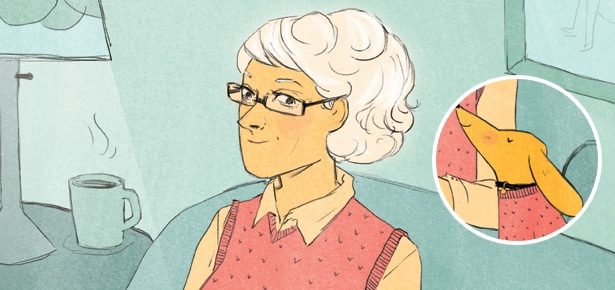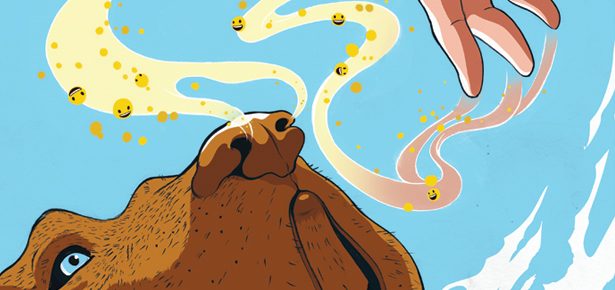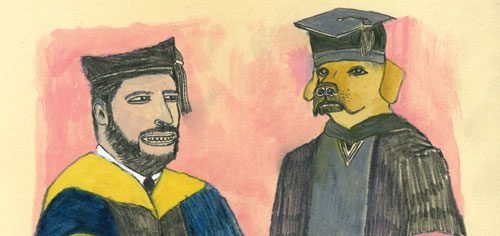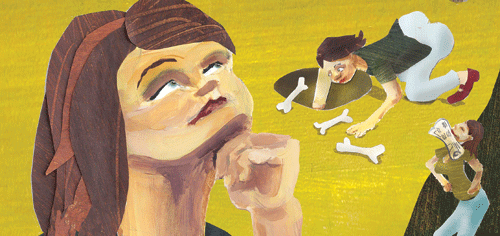
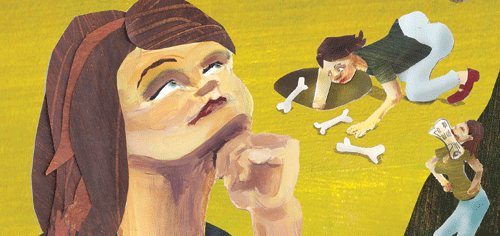
Think Like Your Dog
How to bring out the pooch in you
One stormy night, your six-year-old daughter awakens to
the sound of thunder. She runs to you, scared, shaking.
You comfort her and tell her that it’s just giants bowling,
up in the sky. She smiles, calms down, and crawls into bed
with you. You read her a story, then, as she nods off, you carry
her back to her bed, tuck her in, and hope that the weather
cooperates. This is what parents do; this is good.
On the same night, in the home next door, a six-month-old
German Shepherd awakens to the same thunder and runs
about, whining, whimpering. Doris, a grandmother of four,
says: “It’s okay, Missy. Don’t worry, I’m here,” stroking the dog
as thunder rattles the windows and Missy shivers and whines.
The Pitfalls of Humanizing
Your reaction to your daughter’s fear was natural and
appropriate. You helped get her through the fear and even put
a funny face on the event. But what of Doris and Missy? Ah,
Doris. A kinder soul there has never been. But as far as Missy’s
well being was concerned, she couldn’t have done a worse
job. Doris thought like a human instead of like a dog and, in
the process, convinced Missy that thunder was a thing of the
underworld, and that shaking, peeing, whimpering, and hiding
were the appropriate responses to it.
Doris, by stroking and consoling Missy through the event,
inadvertently praised the frightened dog for her fear, and
her reactions to it. In Missy’s canine mind, if showing fear
gets rewarded, then doing so every time will elicit the same
response. Missy got attention for being scared.
We can’t help humanizing our dogs. I’ve been guilty of it
myself, especially with my old superdog, Lou, who was as close
to human as a dog could get. They comfort us and, over time,
we almost forget that they are dogs. But things are more concrete
with canines; if showing fear gets rewarded, that dog will
keep shivering and shaking every time the windows rattle.
What Dogs Want
Dogs were once our utilitarian partners, bred to work and
to share the duties of life. Herders, hunters, protectors—dogs
earned their keep and, with it, our thanks. As a reward for their
the end of a day, we both came home and appreciated each
other. But today, most dogs don’t do much save keep us company.
Their jobs are to be companions, period. What they used
to get for a job well done has become their sole raison d’être;
they exist now only to please us, to serve as petting posts. You
know what? They liked the old model better.
In their bones, dogs are workers, and engines of purpose.
They strive to do; that’s how they think. They live in the
moment, and communicate with looks, postures, vocalizations,
and behaviours, and learn through smells,
sounds, and interactions. Dogs are reliable,
predictable, trustworthy, and thoroughly
pragmatic. Abstractions don’t register
with dogs.
Humans, on the other hand, are
complex, and introspective. We
understand metaphor and satire
and can read between the lines.
We are also vengeful, spiteful,
and irrational, especially in the
eyes of dogs, who never hold
grudges, and can forgive the worst
ruffian his sins. We need validation,
and strive for equality and justice.
Admirable things, all. But when we fail
to recognize the species-specific differences
between dogs and us, problems start.
Dogs Are Unique
There is no democracy in the canine world. Breeds are inherently
unique and, as such, meant to be profiled, and treated
differently. Train a Rottweiler like a Toy Spaniel and, well,
you’d end up with a really big, troublesome Toy Spaniel. But
many owners today try to do just that; they ignore the needs of
the species and breed, and instead humanize, homogenize, and
democratize their dogs, to the pet’s disadvantage.
Over and again, well-meaning owners try to turn their dogs
into proxy people. By doing so, they teach their dogs that they
have parity with everyone in their homes, giving them license
to contend, disobey, or even discipline—all normal behaviours
for a dog who thinks it is equal in stature to a human. It’s
unfair to the dog and disrespectful to the species; would you
want to be treated as anything other than a human?
Effective Canine Empathy
Instead of trying to turn your dog into a proxy person, why
not turn yourself into a proxy dog, and try to see things
from a dog’s-eye view? It’s easier for us to
embrace their mindset, than for them to
embrace ours. I call it effective canine
empathy, a system whereby you
emulate the way your dog processes
information and interacts
with her world. Here’s how to
become more attuned to your
dog’s perspective:
Live in the canine
moment. Your dog lives from
moment to moment, processing
information and acting upon
it. She does not daydream about
coming summer vacations; she
thinks about the smell of a barbeque
a mile off, or the sound of a Poodle barking
down the block. To better understand
your dog, try to emulate this. Become intimately
aware of your surroundings; really listen, smell, touch, and
see everything as it happens. Be the dog. What is the neighbour
cooking? Why is that crow circling? What dug the burrows in
your yard?
Understand posture. Dogs communicate with their bodies.
You should understand and emulate this. When a dog jumps on
someone, it’s not because she’s happy; it’s because she wants
to control the greeting and set the tone of the relationship.
When a dog won’t make eye contact with you, it means she
feels intimidated. When a dog bumps another dog at the park,
it’s not play; it’s control. A good owner knows what his or her
dog is thinking from what the dog does with her body. Master
this and you’ll be better able to predict her behaviour.
Use your body as a dog would; if you want to turn left while
walking your dog, do so, even if it entails using your body to
cut off your dog’s forward motion. Don’t let your dog jump on
you, and, with an assertive dog, avoid roughhousing games
which might teach her that she can vie with you physically.
Be an elder. Dogs are tribal, with loyalty to their family
packs and an inherent sense of social position. If you let them
take over, you risk disobedience, and sometimes even aggression.
This kind of dog will often
disobey commands if she thinks
something else is more worthy of her
attention. In my mind, a well-trained
dog is one who wants to do “A” but
does “B” because she knows you
want her to. That’s leadership and
trust. A truly good owner becomes
a sage elder to his or her dog; like a
third-grade school teacher, you love,
but also direct and teach. You do not
make excuses for an unruly student.
Dominant dogs understand this; you
should too.
Practice calm indifference. Watch
a dominant dog interact with subordinates;
what do you see? The head dog rarely fawns all over the
others; rather, the subordinates pay more attention to the head
honcho, who stays calm and casual. That’s how you should act
with your dog. Stay thoughtful yet calm to prevent your dog
from overreacting.
Be predictable. Dogs are creatures of ritual. Yet some owners
can be unreliable in how they interact; one moment you let
your dog up onto the bed, the next you yell at her for the same
action. Try to be more like a dog in your predictability. Set rules
and routines, and stick to them!
No grudges. Dogs don’t understand grudges. You should
be that way too; if your dog gets out of line, deal with it, then
move on. It’s the doggish thing to do.
Dogs have rights and responsibilities. Your dog is not a
trust-fund baby, but a trusted member
of your pack. She has the right
to your attention and a responsibility
to behave. Bad behaviour from
your dog isn’t always your fault; as
beings with free will, dogs sometimes
make the wrong choices, so
it’s your job to deal with that. But
always remember that you and she
belong to the same clan; she rates
your deference.
Be confident, and curious. All
great dogs have an air of confidence
about them that is infectious. To be
a great owner, emulate this. Also,
be curious in front of your dog;
when she sees you investigating new things, she’ll be more
likely to emulate you.
Pretending that your dog is a child sounds fun, but it will
only serve to confuse and disrespect her. Instead, be more like
your dog. She sees you as a big, lovable, elder pooch; is there
any reason to act otherwise?
Join the newsletter and never miss out on dog content again!
"*" indicates required fields
By clicking the arrow, you agree to our web Terms of Use and Privacy & Cookie Policy. Easy unsubscribe links are provided in every email.

